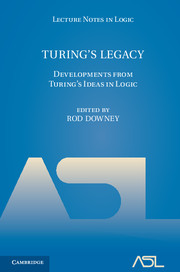Turing’s Legacy: Developments from Turing’s Ideas in Logic
Rod Downey, Editor

Year: 2014
ISBN-9781107043480
539 pages. Hardcover.
Buy now (when ordering, include the discount code ASL2016 to receive the 25% ASL member discount)
Alan Turing was an inspirational figure who is now recognised as a genius of modern mathematics. In addition to leading the Allied forces’ code-breaking effort at Bletchley Park in World War II, he proposed the theoretical foundations of modern computing and anticipated developments in areas from information theory to computer chess. His ideas have been extraordinarily influential in modern mathematics and this book traces such developments by bringing together essays by leading experts in logic, artificial intelligence, computability theory and related areas. Together, they give insight into this fascinating man, the development of modern logic, and the history of ideas. The articles within cover a diverse selection of topics, such as the development of formal proof, differing views on the Church–Turing thesis, the development of combinatorial group theory, and Turing’s work on randomness which foresaw the ideas of algorithmic randomness that would emerge many years later.
- Traces the progression of Turing’s ideas and the subsequent development of many major areas of logic
- Contains essays by leading experts that reveal cutting-edge perspectives on Turing’s ideas
- The book is broad in scope and explores developments in artificial intelligence, computability theory, higher recursion, formal proof, and beyond
Table of Contents
- Computability and analysis: the legacy of Alan Turing Jeremy Avigad and Vasco Brattka
- Alan Turing and the other theory of computation (expanded) Lenore Blum
- Turing in Quantumland Harry Buhrman
- Computability theory, algorithmic randomness and Turing’s anticipation Rod Downey
- Computable model theory Ekaterina B. Fokina, Valentina Harizanov and Alexander Melnikov
- Towards common-sense reasoning via conditional simulation: legacies of Turing in artificial intelligence Cameron E. Freer, Daniel M. Roy and Joshua B. Tenenbaum
- Mathematics in the age of the Turing machine Thomas C. Hales
- Turing and the development of computational complexity Steven Homer and Alan L. Selman
- Turing machines to word problems Charles F. Miller, III
- Musings on Turing’s thesis Anil Nerode
- Higher generalizations of the Turing model Dag Normann
- Step by recursive step: Church’s analysis of effective calculability Wilfried Sieg
- Turing and the discovery of computability Robert Irving Soare
- Transfinite machine models P. D. Welch.